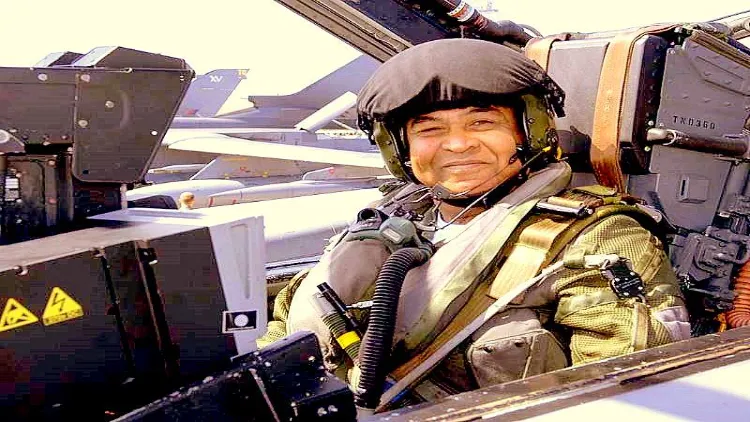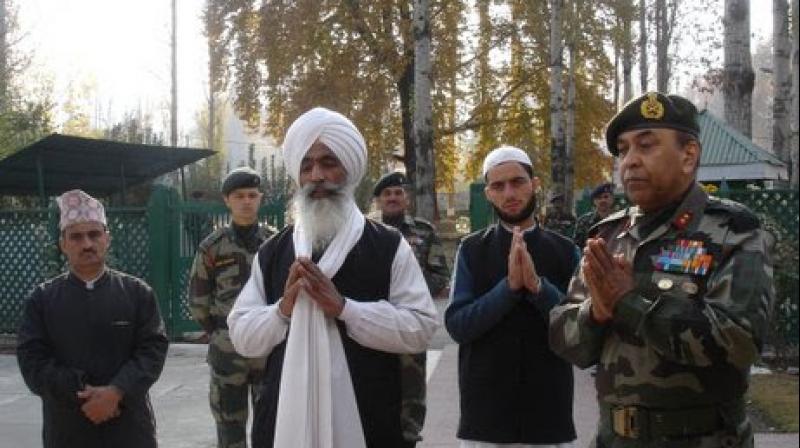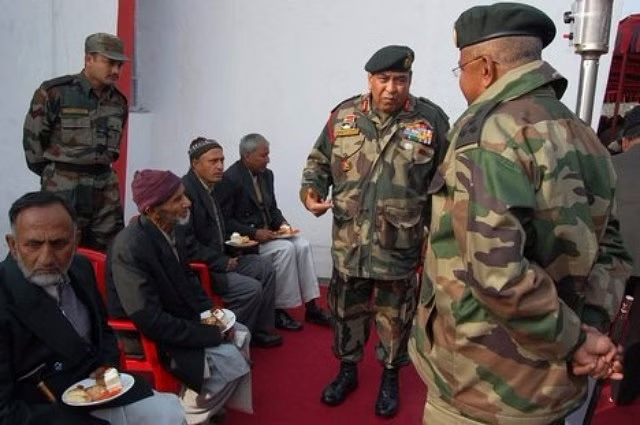.jpg)
Aasha Khosa/New Delhi
Lt Gen (retd) Syed Ata Hasnain is one of the most expressive Army veterans. He speaks on issues of India’s internal security and explains strategic issues in the common man’s language. General Officers like Hasnain live up to the image of a quintessential soldier who is always on duty. As a member of the National Disaster Management Authority, he was recently the communication point person of the government for the Silkyara Tunnel rescue operation in Uttarakhand. With his 40-year experience in the Army and contribution to the evolution of India’s strategic culture through his candid conversations on television shows, and write-ups in the national media, General Hasnain is a role model for many aspiring men and women.
However, not many would know that General Hasnain’s father (also a Maj Gen) was the only Muslim officer in his Garhwal Rifles unit back in 1947. He made the choice of remaining part of the Indian Army and his younger son followed him into the profession of soldiering and rose to be a Lieutenant General. Lt Gen Ata Hasnain spoke about his journey as a soldier and also how the Army maintains its secular ethos even as different regiments have war cries based on religion, to Awaz-the Voice. The following are excerpts from the conversation with Aasha Khosa, Editor, Awaz-the Voice.
‘Why joining the Indian Army doesn’t make you a lesser Muslim’. What made you write an article with this headline; what was the context?
I wrote this article because there is apprehension among a lot of Indian Muslims that they don’t have a place in the Indian Army. They feel they will be somehow discriminated against; their dietary habits will not be respected in the Army. Of all things, they feel they are expected to consume alcohol in the Army. Misperceptions about such things have existed for a long time and especially among the people living in the walled areas of cities of Uttar Pradesh and elsewhere. Since they have no access to the Army and its culture. It’s important to sensitise not only Muslims but also all segments of society about the social and professional aspects of the Indian army. I clarified to young Muslims that by joining the Indian Army you make yourself, your family and your faith proud because to defend the nation you belong to is the duty of every Muslim.

Lt Gen (Retd) Syed Ata Hasnain flying (Facebook)
My journey was different. I have no hesitation in saying that I am a privileged person. My father was in the Indian Army; he retired as a Major General. That way I was born in the Army – the post-independence one. My father originally belonged to the pre-independence British Indian Army and he continued to remain a part of the Indian Army after India’s independence. Consciously, he said a clear no to any thought of joining the Pakistan Army. He said that he belonged to a regiment of the Indian Army that he deeply respected; this was his home, his profession. When it was for me to make a choice, I said I would also join the Army. I joined the same regiment; the same battalion (4 Garhwal Rifles, a unit he raised).
There are a few aspects and anecdotal references that are interesting for the public at large.
I was the only Muslim in my unit. Garhwal Rifles is a single class regiment. Garhwali jawans are all Hindus and very devout ones. After all, it’s the land of Char Dham (four key Hindu pilgrimages). I used to go to these locations very often while in service. I have visited Badrinath several times, the seat of our presiding regimental deity Lord Vishnu. This is not something unusual. In the Army, we learn to respect each other’s faith. I once wrote an op-ed in the Times of India that the faith of the soldiers is the faith also adopted by their officer. If your jawans are Christians, you virtually follow Christianity with them, whatever be your personal faith. In a single class regiment like mine I have followed the Hindu faith with my men. In operational deployment you will be in and out with your men and it’s empowering if they look up to you in every way.
It often means that on Sundays you attend ‘mandir’ with your jawans; in peace location your wife and family also join in. Before going on operations, be it in Sri Lanka or Siachen, we first go to the ‘mandir’, offer prayers; fold our hands, apply teeka (vermillion mark on forehead), and, on return, we again repeat the same. We raise the war cry of Badri Vishal Lal ki Jai, meaning ‘victory be to the followers of Lord Vishnu. These are very important aspects in command of troops; it’s a different kind of responsibility you carry. If people think they can’t do it because they are Muslim or Christian, then the Army is no place for you. We are very firm on this; this is our ethos, respect, transparency, and diversity. In no way does one compromise on this. Just because I am commanding Hindu troops and respecting their faith, I don’t become a lesser Muslim. In the army, there is no way anyone’s faith can get compromised.

Lt Gen (Retd) Syed Ata Hasnain attending an all-religions ceremony
How do you do it? On one side, when we look at an Army man's image of poise, valour, and discipline, people flash into our minds. Yet all the war cries are based on religion. You are from a privileged background and your case may be different. But is there a possibility that somebody coming from a conservative background finds himself a misfit in this environment?
There are a lot of people in India who find it as such and I don’t blame them. Their social environment, level of education, etc. are behind it. I consider myself as having been born a Muslim; remained Christian by education – I am from Sherwood College, Nanital; I belong to a Hindu regiment and have followed all rituals of the faith as followed by men, and my best friends are all mostly Sikh. I imbibed the values of all faiths. However, it’s not easy for everyone to do so and assimilate everything so easily. I don’t blame those who find they are not up to it to follow suit, especially if they are brought up in a closed environment without diversity. However, after they come into the Army (as officers) they find the environment is different from what they had thought. We train them; more than anything it’s about sensitizing them about the troops. They are told that the jawan is their buddy; he’s with them in the thick and thin of war fighting. They are educated about the Indian Army’s ethos and the need to respect jawans’ culture and faith while fully respecting and following your own faith.
There is also the other side to it: In the Army, there are pure Muslim companies in the Grenadiers and Rajputana Rifles and their officers could be Hindu, Christian, or Sikh. This means 130 Muslim men could have a commander who is from a different faith. I have seen an officer who follows the Hindu faith but offered five-time namaz and kept 30 roza (fasting in the month of Ramazan) with all his troops. It’s not that I was the only Muslim amidst Hindu troops. Officers from different faiths all contribute to this great ethos.
We are proud of our traditions and we like to sell this idea to the rest of the people. They must see the diversity of the Indian army. You must look at the Jammu and Kashmir Light Infantry’s passing-out parade. It’s such a thrilling sight to see a Moulvi, Panditji, Granthi, and a Buddhist priest together carrying their respective religious books and moving in front of the recruits. The recruits just touch the book to take the pledge to defend their country with their lives. It shows how much we respect religion.
This means that Muslims shouldn’t have any misgivings about joining the Army. Even those who come with misconceptions and yet join the Army will go through training to change their mindsets. Religion and duty are two different things. Am I right in this understanding?
Let me clarify one small thing. There are sometimes doubts in the minds of the people that when they join the Army their dietary habits will not be taken into cognizance. Whether they will get meat dressed in their preferred way or maybe they have to consume forbidden foods – such worries do exist. I want to assure them and especially the youth of India that there is no other institution as sensitive towards religion as the Indian Army. It works like this: if the sanctioned strength of a company of 120 men are all of one faith or if 120 men of one faith exist in a unit it will be sanctioned a Religious Teacher (RT) of that faith. His responsibility is the emotional stability and moral teachings of the faith. Many times an RT of one faith conducts religious discourses of another faith and the soldiers have total faith on him; no questions asked. The Army’s culture and way of life is very difficult for anyone outside to understand. The food is delivered as per the dietary habits of the troops. Suppose under some circumstances it’s not possible to supply the requisite food, then it’s compensated through the alternate food with the same calorific value as sanctioned; they will get paneer, butter and milk in place of meat.
Tell me some stories of your interaction with the locals in Kashmir, where you were so popular even in the heyday of militancy; locals even believed someone from your family belonged to Kashmir.
I am from UP, Prayagraj or Allahabad, as it was called. I strongly believe that my understanding of diversity and educational background reveal to me that if you wish to serve in an environment involving terrorism, militancy or insurgency, you have to know the culture of that place. If I am to serve in Nagaland and I don’t know the Naga culture, which is a unique culture, and if I don’t know about Christianity, then I am not empowered enough to serve there. People think that soldering is all about picking a rifle and firing a bullet. They don’t realize that there are thousands of things involved with soldiering. As a commander, I can’t be seen as a person whose only job is to pick a gun and fire here and there. If I want to ensure peace, I must be able to sit with the people on equal footing and talk to them in their language about their culture and their requirements. I have to win their trust and convince them that the bullets my men fire are against terrorists and not against the people. In the course of such operations lots of soldiers make mistakes because of the tense environment and civilians do suffer. My intent is always to restore normalcy at any cost but the terrorist thrives in the chaos he creates. This is a worldwide phenomenon wherever terrorism persists.
So, understanding culture is very important. In Kashmir, I have served repeatedly in different ranks. The realization that culture is a very important component of fighting terrorism came to me very early. Therefore, I studied the local culture. I didn’t know Islam well enough so I studied Islam in depth to be able to converse with different kinds of people with greater confidence.
Understanding culture is a very important aspect of dealing with a counterinsurgency situation. In such an environment there is a centre of gravity; which is the core strength. People are the centre of gravity in this situation. So, you have to understand that the side with whom people's support is will eventually win the war. You may eliminate 10,000 terrorists, but if people are against you, you will never win the war. You have to have a two-track policy: on one side you have to eliminate terrorists and on the other, win the hearts and minds of the people. You can’t do it artificially. Unless people are convinced about your sincerity it will not happen and that comes when you understand the culture, religion, and sensitivities of the people. This is exactly what I did.

Lt Gen (Retd) Syed Ata Hasnain interacting with locals in Kashmir
There is no doubt that one of the biggest assets of India is the fact that we have a huge youth bulge. We are the youngest nation in the world as 65 percent of our population is below 35 years of age. We need to ensure that this bulge can deliver, and deliver to the world. Unfortunately, this can become exactly the opposite, if the youth is not adequately educated, not trained or their aspirations are not met; this segment then becomes extremely dangerous.
We know that India is not such a rich country and we are looking at PM Modi’s aim of taking our economy to 5 trillion dollars in a couple of years. I am sure we will go even beyond that. But it’s the interim period in the march to that goal which is dangerous. The population is increasing; and aspirations are going up; the media and information revolution has brought all that into the public domain. Everyone is watching as luxuries are shown on glossy magazines and social media. It gives rise to too many aspirations, which then create turbulence. I am trying to contribute from my side to address this.
I have always considered myself a good communicator; I was never short of words. I have an idea and I can generate it in words quickly. As you rightly said, I was all over social media a few years ago but I have pulled back a bit. Facebook, Twitter and Instagram are platforms which can be effectively utilized for educating, cultivating the right understanding of an issue and countering adversary propaganda. What people don’t know is that I often talk to big corporate houses; I sensitize very educated people and their families. One thing is that I am very sensitive to gender. I make sure that they bring their spouses to these lectures for a better understanding of their own power and the role of women in society. I am one of those who never believe that a woman’s place is only in the kitchen or at home. I want women to listen to my talks; women are equal partners in the growth of the country and should not be left behind.
I follow total politeness on social media and follow the norms of my own profession; no politics, no personal financial issues and nothing against the nation’s interest. I am sensitive towards people though I may be humorous once in a while. The most important thing is that the people of India should see a General of the Army as a role model; you can’t let down the education, the ethos, the experience, and the sensitivity that this organization has taught people like me.
We are told that future wars are of the fifth-generation variety. So, what opportunities other than fighting should the youth, especially from the minorities, look into for joining the army?
I am always the one who doesn’t believe in the perception that armed forces are only there to fight. I believe in the Sun Tzu adage: ‘win a war without fighting a war’. Technology is going to play a very important role in future wars. The recent Caucasian war between Azerbaijan and Armenia over Nagorno-Karabakh was a war of technology. We still haven't seen enough of it. In the next 7-9 years, you will see the war being fought with different weapons like drones and information systems including artificial intelligence.
There is much scope for youth to seek proficiency in technology and use that to effect in the armed forces. You may think that a particular technology is of no use to civilians but the same may be of huge interest to the armed forces. All aspects of communication in the world have mostly risen from the military domain. The internet was started because the US military wanted a faster and more reliable mode of communication to its overseas deployments. In the future, there will be non-contact fifth-generation wars carried out sitting in drawing rooms.
ALSO READ: Kirti Chakra amplifies heroism of Havildar Majid Hussain in Poonch
You have to capture the psychology of the enemy; overpower his mind; convince them that we are far superior and you can’t win a war against us. This is the domain of communications strategy. In this, in the Army we are at the inception stage; perhaps we need to delve into ways of exploiting social media in a more effective way. Research on this is necessary. There is continuing fillip in social media with which we need to keep pace. With the nature of war changing there will be all kinds of opportunities for youth of tomorrow to acquire necessary skills to be an effective part of the Army.
This is an abridged version of an interview conducted in 2022.
See Video of the interview:
